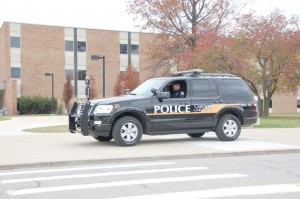Staying S.A.F.E. and avoiding tickets

While driving to school one day before exams, the blue and red lights flashed in his rear-view mirror. With sweaty palms and increased awareness, he pulled over.
“I was running late for my intro to film exam, so I was speeding to class,” Walter Hooper, a junior majoring in journalism, said. “The officer asked me the general questions, but let me go with a warning.”
The project, appropriately titled “Project S.A.F.E. Streets” (S.A.F.E. stands for Stop Accidents From Escalating), targets specific roads on particular days and times watching for certain traffic violations. Officers commonly examine a driver’s speed, ability to stop at stop signs and how closely they follow other cars. The program has decreased parking violations by 20 percent.
Recently, there was a three-day effort completed by the departments. During that time frame, officers administered 93 traffic stops and handed out 88 parking citations. Of those 88 citations, three of them were for text messaging while driving.
“We’re really starting to crack down on texting and have been looking for it,” OUPD Captain Mark Gordon, who has worked with the department for 22 years, said. “Be careful, because if you’re caught doing it, you will get a ticket.”
Though there are three to five days spread out for the patrolling, students and the general public are notified in advance before the officers start watching through announcements made available on the OUPD website.
While getting a ticket happens to everyone at some point in time, many people do not know how to act once pulled over, according to Emily Moore, a junior majoring in nursing.
Moore was pulled over for going 10 miles per hour over the speed limit while driving through her subdivision.
“I tried to fight the ticket because it was my first one, but it didn’t work. Instead, I had to pay court fees and miss work to take a Saturday class instead. It was terrible and I cried a lot.”
Randy Plante, a police officer in Utica, has dealt with various lawbreakers during his 11 years as a policeman.
Instead of being scared and panicing, Plante says it is important to make the stop as easy on the officer as possible so they do not perceive you as a threat to their own safety.
“When getting pulled over, your job starts as soon as the lights start flashing,” Plante said. “Officers select a place that is safe for the both of you to pull over, so pull over as soon as they signal and don’t try to find a better area.”
According to Plante, a common mistake made by most is that people getting pulled over automatically assume they are going to need to get out their license, registration and proof of insurance, so they dig for it instead of waiting until prompted.
“Not all officers ask for that information,” Plante said. “If you get pulled over, just keep your hands on the wheel until further directed to do otherwise. It will put the officer at ease.”
Gordon said that the worst thing a violator could do is get out of the vehicle to talk to the officer while they are processing the ticket.
“Be respectful to the officer,” Gordon said. “The officer will explain what you got pulled over for, and if he doesn’t, you have the right to ask. Just stay in your car and wait for him to come back.”
More information on S.A.F.E. is available at www.police.oakland.edu/safestreets, and the public can be more educated by following the steps on the website.







